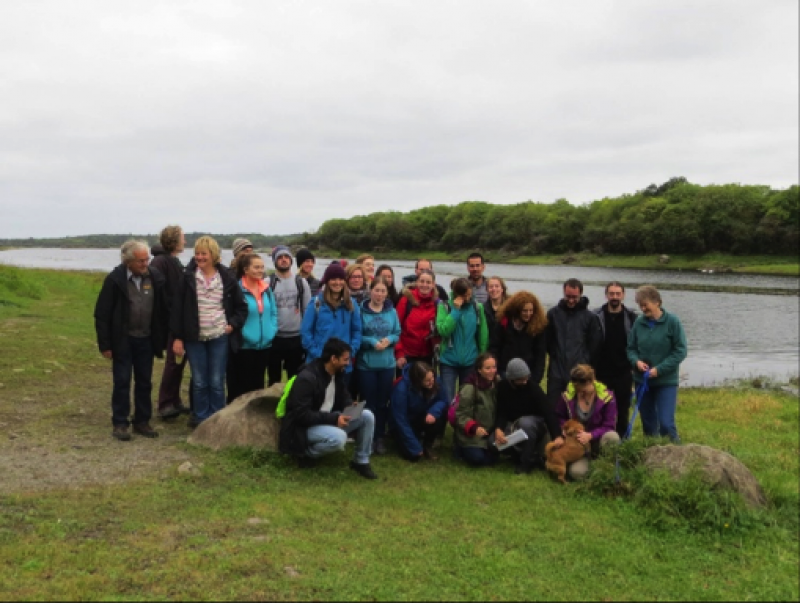Atlantic Ocean Climate Scholars: Galway, Ireland
Amrit Kumar Mishra
Plymouth University

I am grateful to Challenger Society, UK for the Travel Award 2016, which helped me to attend the Atlantic Ocean Climate Scholars Program, 2016 at National University of Ireland, Galway, Ireland. This training was a unique opportunity for me to be part of 24 international students from 10 different countries to be trained entirely on effects of climate change on the Atlantic Ocean Ecosystem. The summer school was part of training program from Partnership for Observation of Global Oceans (POGO), Strategic Marine Alliance for Research and Training (SMART), Alfred Wegner Institute (AWI) etc., in their aim to increase capacity building and education outreach in the field of marine science.
The summer school lasted for 8 days packed with scientific presentations, field work and laboratory analysis, climate modelling and climate negotiations scenarios about Atlantic Ocean Ecosystem. The opening sessions of the summer school was based on scientific talks focused on global climate system as a whole and the role of Polar systems in climate change. There was a special session of calculating energy balance of our planet by Nobel Laurate, Professor Peter Lemke of AWI, which was very interesting and I got good experience for the role of modelling in climate change scenarios.
The most learning curve for me was the long term data analysis of Helgoland Field station of AWI, where the importance of long term data collection, analysis and interpretation of results was emphasized in the field of understanding Atlantic Ocean dynamics. Following this practical I also got important information on Sea Ice and Ecosystems and the impacts of Permafrost in the dynamics of climate change. The role of permafrost in climate change was very interesting and important as it relates directly to my field of studies on seagrass ecosystem, where the intake and release of carbon dioxide is emphasized.
The role of scientific tools, modelling and global ocean observation systems were emphasized to understand Atlantic Ocean ecosystem and also how POGO and SMART are leading the scientific world was discussed? group discussion was used for the future challenges and opportunities for specially trained climate science students in framing policy and mitigate climate change.
I presented my research work on effects of climate change on seagrass ecosystems and how the seagrass ecosystems work as an important carbon sink globally? What are the importance of coastal seagrass ecosystem services and their role in mitigating climate change? My presentation also coincided with a session of climate policy and management of ecosystems.
Filed work at Mace Head weather station at one of the six weather monitoring stations of the world was an amazing experience, where weather data are collected for more than 50 years and how this data helps in deciphering the change in Atlantic Ocean and atmosphere interaction was discussed. Another field trip was done to Irelands unique ground water bodies to understand the importance of ground water interaction with coastal areas and the influence of sea level rise on flooding.
The last day of the training was used for Climate Change Negotiations based on International Panel for Climate Change Fifth assessment report, in a real time scenario like Convention of Parties (CoP), meetings. Individuals from different countries formed six groups and tried to negotiate on carbon emissions. This negotiation scenario was intense learning platform and informative about the decisions taken at CoP.
Overall the training provided me inputs and experience in climate change research and made me realize how integration of various disciplines to tackle the global change issue, which I will try to integrate in my research work. It also provided opportunity to network with various international students, researchers and scientists to share our ideas and experiences on field of climate change. I look forward to utilize this experience to enhance my scientific research career.
Thanks Challenger Society for the opportunity.
Profile:
Amrit Kumar Mishra is third year Erasmus Mundus Doctoral Researcher on Marine Ecosystem Health and Conservation (MARES) program at Marine Biology and Ecology Research Centre, University of Plymouth, UK and Centre for Marine Sciences, University of Algarve, Portugal. My research work is focused on “Global change effects on seagrass ecosystem and their role as carbon dioxide (CO2) sinks”, where I investigate the effects of high CO2 on seagrass (Cymodocea nodosa, Posidonia oceanica and Zostera noltii) net community production, their biochemical changes, effects of trace elements on their physiology and total C and N content. In my research natural CO2 vents of Greece and Italy representing future conditions are used as analogues to better understand the effects of high CO2.
Latest News
Royal Society Publishing Photography Competition 2025
Please see a message from the Royal Society below:
We are delighted to announce that the 2025 Competition is now open for entries until 15 August for a chance to win £1000! The competition celebrates the power of photography in conveying the wonder of science happening all around us and photographs can be submitted in the categories of: Astronomy, Behaviour, Earth Science and Climatology, Ecology and Environmental Science, and Microimaging.
The competition is free to enter and open to anyone studying or working in science at graduate level or above. Category winners will receive a one-year membership to the Royal Photographic Society and the overall winner will receive a grand prize of £1,000. Find out more: https://bit.ly/RSPphotocomp
October 2025 MEDIN Workshop: Marine Data Management, Governance and the MEDIN toolset
The Marine Environmental Data and Information Network (MEDIN) are pleased to announce that registration is now open for the next occurrence of our popular free online training workshop: ‘Marine Data Management, Governance and the MEDIN toolset’ on the 13th – 17th October 2025 on OceanTeacher Global Academy.
Marine Data Management, Governance and the MEDIN toolset
The Marine Environmental Data and Information Network (MEDIN) and OceanWise are delighted to invite you to attend our popular free online training workshop: ‘Marine Data Management, Governance and the MEDIN toolset’ on the 19th – 23rd of May 2025.
